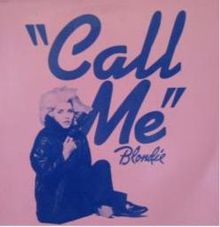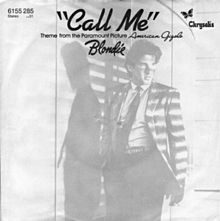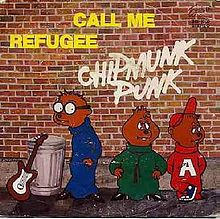- Call Me (Blondie song)
-
"Call Me" 
Single by Blondie from the album American Gigolo (soundtrack) Released February 25, 1980 Format Vinyl 7" & 12" single Recorded August 1979 in New York[1] Genre New Wave Length 3:32 (7" version)
8:04 (LP version)Label Polydor Records
Chrysalis Records
Salsoul RecordsWriter(s) Debbie Harry, Giorgio Moroder Producer Giorgio Moroder Certification Gold (US)
Silver (UK)Blondie singles chronology "The Hardest Part"
(1980)Call Me
(1980)"Atomic"
(1980)Audio sample file info · helpAlternative cover  German edition
German edition"Call Me" is a song by the American new wave band Blondie. Released in 1980, "Call Me" topped the singles charts in both the US (where it became the band's biggest selling single and second #1[2]) and the UK (where it became their fourth no.1 hit).
Contents
Song and single information
The song was the main theme of the film American Gigolo. European disco producer Giorgio Moroder originally asked Stevie Nicks from Fleetwood Mac to help compose and perform a song for the soundtrack, but she declined (as a recently signed contract with Modern Records prevented her from working with Moroder). It was at this time that Moroder turned to Debbie Harry and Blondie. Moroder presented Harry with a rough instrumental track called "Man Machine." Harry was asked to write the lyrics and melody, a process that Harry states took only a few hours.[3] The completed song was then recorded by the band, with Moroder producing. The bridge of the original English language version also includes Harry singing "Call Me" in Italian ("Amore, chiamami") and French ("Appelle-moi, mon cheri").
In the US the song was released by three different record companies: the longest version (at 8:06) on the soundtrack album by Polydor, the 7" and 12" on Blondie's label Chrysalis, and a Spanish language 12" version, with lyrics by Buddy and Mary McCluskey, on disco label Salsoul Records. The Spanish version, titled "Llámame", was meant for release in Mexico and some South American countries. This version was also released in the US and the UK and had its CD debut on Chrysalis/EMI's rarities compilation Blonde and Beyond (1993). In 1988, a remixed version by Ben Liebrand taken from the Blondie remix album Once More into the Bleach was issued as a single in the UK. In 2001 the "original long version" appeared as a bonus track on the Autoamerican album re-issue.
Popularity and acclaim
The single was released in the United States in February 1980. It peaked at #1 for 6 consecutive weeks, and was certified Gold (for one million copies sold) by the RIAA. It also spent four weeks at number two on the U.S. dance chart. The single was also #1 on Billboard magazine's 1980 year-end chart. It was released in the UK two months later, where it became Blondie's fourth UK no.1 single in little over a year. The song was also played on a British Telecom advert from the 1980s. Twenty-five years after its original release, "Call Me" was ranked at #283 on the list of Rolling Stone's 500 Greatest Songs of All Time.
The song lists at #44 on Billboard's All Time Top 100.[1]
Music video
There were two videos made:
- One was compiled clips and video footage in New York and Manhattan of Deborah Harry. The video can be found on the 1991 UK video compilation The Complete Picture: The Very Best of Deborah Harry and Blondie.
- The other, which came out in 1980, was non-representational, not featuring any of the band. It depicted a New York taxi driver (who had in fact appeared in numerous other Blondie music videos) driving his Checker through Manhattan traffic. This version was part of the 1981 "Best Of Blondie" compilation video.
Release history
All tracks written by Deborah Harry and Giorgio Moroder.
- US, UK 7" (CHS 2414)
- "Call Me (Theme from American Gigolo)" (7" edit) – 3:32
- "Call Me" (7" instrumental) – 3:27
- UK 12" (CHS 12 2414)
- "Call Me" (7" edit) – 3:32
- "Call Me" (Spanish version - 7" edit) – 3:32
- "Call Me" (7" instrumental) - 3:27
- US 12" (Polydor PRO 124)
- "Call Me" (Theme from American Gigolo) – 8:04
- "Call Me" (12" instrumental) – 6:10
- US 12" (Salsoul SG 341) [promo only]
- "Call Me" (Spanish version, extended) – 6:23
- "Night Drive" (Reprise) - by Giorgio Morodor – 6:10
In Film
An instrumental version of the song appeared in the 1981 film First Monday in October.
The song appeared in TV series Quantum Leap, episode Another Mother (credits)
The song appeared in 1998 film Bride of Chucky
The song appeared in 1999 comedy film Deuce Bigalow: Male Gigolo
The song appeared in 2005 film The Business (credits)
Chart peaks
Chart (1980) Peak
positionUS 1x6 Canada 1x6 UK 1 Australia 2 Ireland 2 Norway 2 Sweden 3 Switzerland 3 Austria 5 New Zealand 6 Netherlands 9 Germany 14 Track listing
- "Call me (Blondie cover)" - 3:18
- "A dying star" - 4:36
- "Sailing away" - 4:00
Chipmunks version
"Call Me" 
Single by The Chipmunks from the album Chipmunk Punk Released August 1980 Format Vinyl Recorded September 1979 Length 3:11 (LP/radio version)
3:49 (12" version)Label Excelsior Records Writer(s) Debbie Harry
Giorgio MoroderThe Chipmunks singles chronology "My Sharona"
(1980)Call Me
(1980)"On the Road Again"
(1981)In 1980, KMET DJ Chuck Taylor played the 12" version of this single at double speed and announced, in jest, that it was The Chipmunks' latest single. So many requests came for this "new" Chipmunks release, that Ross Bagdasarian, Jr. and his collaborator Steve Vining rushed to record what would be the Chipmunks' "comeback album", Chipmunk Punk in 1980.
Other cover versions
- In 1986, San Francisco-based band Until December covered the single on their self-titled album.
- In 1996, Australian heavy metal band Dungeon covered the song on their demo CD Demolition. The song was later re-mixed and released on the album Rising Power in 2003.
- In 1997, Japanese musician J covered this song as a b-side on his debut single "Burn Out".
- In 1997, Finnish band The 69 Eyes covered this song on their album Wrap Your Troubles in Dreams.
- In 1997, a capella group Da Vinci's Notebook covered this song on their album Bendy's Law.
- In 1999, artist Emilia Mojello recorded a cover for the soundtrack of the comedy film Deuce Bigalow: Male Gigolo.
- In 2001, Korean rock band Eve covered the song in English on their album Swear.
- In 2001, indie punk rock band Squatweiler (featuring musician Patrick Kennedy) recorded a cover for the compilation How Many Bands Does It Take to Screw up a Blondie Tribute.
- In 2001, artist Nikka Costa recorded a cover for the soundtrack of the comedy film Zoolander.
- In 2001, Memphis pop band The Box Tops covered the song for the compilation When Pigs Fly: Songs You Never Thought You'd Hear.
- In 2002, synthpop band I Am The World Trade Center covered this song on their album The Tight Connection.
- In 2002, Tiffany recorded a cover of the song for the compilation Platinum Girl: A Tribute to Blondie.
- In 2003, Finnish rockabilly band Francine included a cover of the song on their album Level 8.
- In 2004, The Dandy Warhols covered this song on their album Come On Feel The Dandy Warhols.
- In 2004, Italian extreme metal band Cadaveria covered this song on their album Far Away from Conformity.
- In 2005, Lea DeLaria covered this song in the jazz album Double Standards.
- In 2005, The Lucky Devils, made their personal Psychobilly interpretation of the song on their 3rd album To Hell.
- In 2006, Filipino pop diva Regine Velasquez covered the single on her album Covers Vol. 2, and it became one of her signature songs.
- In 2006, Korean trot singer Jang Yun-jeong covered the song in Korean on her album Idda Iddayo (이따, 이따요).
- In 2008, The Myriad covered this song as a bonus track on their album With Arrows, With Poise.
- In 2008, American metal band In This Moment recorded this song for a limited edition release of their album The Dream (The Ultra Violet Edition). The song was released as a single on iTunes on May 26, 2009. The music video was released the same day.
- In 2008, Australian singer Tina Arena recorded a retro swing version of the song for her 2008 album Songs of Love & Loss II.
- In 2008, British singer Skye Edwards collaborated with Marc Collin of French band Nouvelle Vague on a cover of the song for the album Hollywood, Mon Amour.
- In 2009, Canadian singer Shannon Butcher recorded a jazz style cover of the song for her album Words We Could Both Say. Audio samples can be heard on both her MySpace page[4] and her official website.[5]
- Nu metal band Union Underground covered the song as a non-album track in the early 2000s.
- Scottish indie rock band Franz Ferdinand were asked by Blondie themselves[6] to cover it for a War Child charity album.
- In 2010 Italian singer Sabrina Salerno and British singer Samantha Fox recorded a dance version of the song.
Live cover performances
- Garbage, No Doubt and The Distillers performed together a live version of the song in November 2002 at the Long Beach Arena.[7][8]
- Ashlee Simpson covered this song live on her 2005 Autobiography tour.
- Diana Vickers performed this track on The X Factor in 2008.
- Fergie alongside Debbie Harry performed this at Fashion Rocks 2008.
- Franz Ferdinand and La Roux performed a live version for the 2009 NME Awards
- American Idol season ten contestant Haley Reinhart performed the song during Idol Goes to the Movies week.
Preceded by
"Another Brick in the Wall (Part II)" by Pink FloydUS Billboard Hot 100 number one single
April 19, 1980 - May 24, 1980Succeeded by
"Funkytown" by Lipps IncPreceded by
"Working My Way Back to You" by The Detroit SpinnersUK number one single
26 April 1980Succeeded by
"Geno" by Dexys Midnight RunnersPreceded by
"Another Brick in the Wall (Part II)" by Pink Floyd
(first run)
"Rock Lobster" by The B-52's (second run)Canadian RPM 100 number-one single
May 3, 1980 – May 17, 1980 (three weeks)
May 31, 1980 - June 14, 1980 (re-entry, three weeks)Succeeded by
"Rock Lobster" by The B-52's (first run)
Cars by Gary Numan (second run)References
- ^ Che, Cathy (1999), 'Deborah Harry: Platinum Blonde', MPG Books Ltd, Cornwall, p.65
- ^ Che, Cathy (1999), 'Deborah Harry: Platinum Blonde', MPG Books Ltd, Cornwall, p.65
- ^ 100 Greatest Songs of the 80s, Episode 2, VH1
- ^ http://www.myspace.com/shannonbutcher
- ^ http://www.shannonbutcher.com/
- ^ http://www.warchild.org/news/Heroes/heroes.html
- ^ http://www.youtube.com/watch?v=gCKZ7HDcRWE
- ^ http://www.mtv.com/news/articles/1457063/no-doubt-take-out-garbage.jhtml
See also
- Hot 100 No. 1 Hits of 1980 (USA)
Clem Burke · Jimmy Destri · Debbie Harry · Chris Stein
Leigh Foxx · Nigel Harrison · Frank Infante · Paul Carbonara · Kevin Patrick · Matt Katz-Bohen · Tommy Kessler · Gary ValentineStudio albums Blondie · Plastic Letters · Parallel Lines · Eat to the Beat · Autoamerican · The Hunter · No Exit · The Curse of Blondie · Panic of GirlsCompilations The Best of Blondie · The Complete Picture: The Very Best of Deborah Harry and Blondie · Blonde and Beyond · The Platinum Collection · Denis · Picture This - The Essential Blondie Collection · Atomic - The Very Best of Blondie · Greatest Hits · Greatest Hits: Sight + Sound · Greatest Hits: Sound & VisionLive albums Singles "X Offender" · "In the Flesh" · "Rip Her to Shreds" · "Denis" · "(I'm Always Touched by Your) Presence, Dear" · "Picture This" · "I'm Gonna Love You Too" · "Hanging on the Telephone" · "Heart of Glass" · "Sunday Girl" · "One Way or Another" · "Dreaming" · "Union City Blue" · "The Hardest Part" · "Atomic" · "Call Me" · "The Tide Is High" · "Rapture" · "Island of Lost Souls" · "War Child" · "Maria" · "Nothing Is Real but the Girl" · "No Exit" · "Good Boys" · "Mother" · "What I Heard"Remixes Related articles Billboard Year-End number one singles (1980–1999) 1980: "Call Me" - Blondie · 1981: "Bette Davis Eyes" - Kim Carnes · 1982: "Physical" - Olivia Newton-John · 1983: "Every Breath You Take" - The Police · 1984: "When Doves Cry" - Prince · 1985: "Careless Whisper" - Wham! featuring George Michael · 1986: "That's What Friends Are For" - Dionne & Friends · 1987: "Walk Like an Egyptian" - The Bangles · 1988: "Faith" - George Michael · 1989: "Look Away" - Chicago · 1990: "Hold On" - Wilson Phillips · 1991: "(Everything I Do) I Do It for You" - Bryan Adams · 1992: "End of the Road" - Boyz II Men · 1993: "I Will Always Love You" - Whitney Houston · 1994: "The Sign" - Ace of Base · 1995: "Gangsta's Paradise" - Coolio featuring L.V. · 1996: "Macarena" (Bayside Boys Mix) - Los del Río · 1997: "Candle in the Wind 1997"/"Something About the Way You Look Tonight" - Elton John · 1998: "Too Close" - Next · 1999: "Believe" - Cher
Complete list · (1946–1959) · (1960–1979) · (1980–1999) · (2000–2019) Categories:- 1980 singles
- Blondie songs
- Songs with feminist themes
- Billboard Hot 100 number-one singles
- UK Singles Chart number-one singles
- Songs written by Giorgio Moroder
- Songs about telephone calls
Wikimedia Foundation. 2010.
